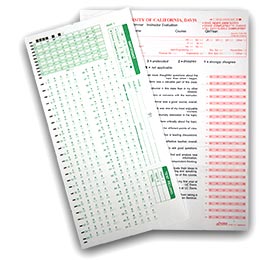Students, professionals offer perspectives on course evaluations
As spring quarter kicks off, students aren’t the only ones looking over their final course grades – professors and TA’s are too.
Course evaluations are a given part of any class at UC Davis and students’ work is done after turning the evaluation in to the respective campus department. But, for the Center for Excellence in Teaching and Learning (CETL), that’s where the work starts.
“With the paper evaluation, the instructors don’t see that piece of paper,” said CETL Evaluation Specialist Barbara Mills. “The instructors or [graduate] students see a collection of the comments that have been typed out, as well as a statistical summary of all the bubbles that have been filled in. They see how many students answered the question and what the [average] was of that question.”
But students remain divided about how much of an influence evaluations actually have on changes in instruction.
According to Mills, course evaluations do have an effect on how instructors structure classes and how class assignments are given to instructors.
“Evaluations are taken very seriously, for instructors at all levels, professors and TA’s,” Mills said. “Instructors use them to help drive what they do in the class, to find out what’s working about the material, the text and the projects, and what’s not working. That information is used also in merit packaging, when they’re making personnel decisions. Evaluations are examined carefully when making TA assignments. That evaluation doesn’t make or break decisions, but it makes a significant impact.”
While course evaluations may have an effect on future teaching styles of instructors, some believe that they can be inaccurate to begin with.
“Some [students] will just do them to get it done, and others will actually take the time,” said third-year biological sciences major Emily Lee. “If you’re going to base [feedback] off of this, it’s not really fair.”
Mills said that students’ responses tend to depend on how the evaluations are administered, specifically in that paper evaluations have a higher response rate than online ones. Some professors will give out extra credit for responding, while others will make it a requirement.
“If the professor really forces you to do it, I’ll just go through it fast and I won’t care,” Lee said. “But if they’re more relaxed about it, I’ll actually put in more effort.”
Some students only take the time to respond when they have more negatively inclined opinions.
“I’d rather use my time to evaluate a bad TA than compliment a good one,” said second-year biochemistry and microbiology double major Anthony Gonsalves. “If I have issues I’ll actually go and fill out the evaluation, but if I don’t I might just not do it.”
In the end though, students do see changes over time based off the evaluations.
“You might not see an immediate change, and sometimes it might take a little more time than students expect,” Mills said. “As a graduate student [in the past], I’d fill out evaluations one quarter, and then come back the next, and say, ‘oh, nothing happened’. But now I see that things don’t happen immediately. So you might fill out an evaluation winter quarter, and it could be used in hiring for summer quarter, or the next year, but it will be used.”
Though evaluations may not be the most entertaining, or have instant results, Mills encourages students to take the time to respond meaningfully if they want to make a difference.
“Working at UC Davis are some of the greatest teachers and researchers, and they’re always looking for ways to be even better,” Mills said.
Photo by Courtesy.




